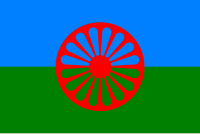Gypsie

Romani flag created in 1933 and accepted by the 1971 World Romani Congress
|
|
| Total population | |
|---|---|
| 2–20 million | |
| Regions with significant populations | |
|
|
1,000,000 estimated with Romani heritage (5,400 per 2000 census) |
|
|
800,000 |
|
|
700,000–5,000,000 /≈2,750,000/ |
|
|
650,000–1,500,000 |
|
|
621,573–2,000,000 |
|
|
350,000–500,000 |
|
|
325,343–800,000 |
|
|
315,583–990,000 |
|
|
300,000–350,000 |
|
|
90,000–300,000 /≈225,000/ |
|
|
182,766–1,200,000 |
|
|
147,604–500,000 /≈250,000/ |
|
|
120,000–180,000 |
|
|
120,000–140,000 |
|
|
105,738–600,000 |
|
|
53,879 |
|
|
50,000–100,000 |
|
|
47,587–400,000 |
|
|
40,370 (Romani speakers)–300,000 |
|
|
≈300,000 |
|
|
40,000–70,000 |
|
|
40,000 |
|
|
32,000–48,000 |
|
|
15,000–60,000 |
|
|
12,778–200,000 |
|
|
16,975–40,000 |
|
|
8,864–60,000 |
|
|
8,301–150,000 |
|
|
6,000 |
|
|
5,255–80,000 |
|
|
11,000–50,000 |
|
|
5,000–25,000 |
|
|
15,850 |
|
|
≈8,000 |
|
|
2,300 |
|
|
<3,000 |
| Languages | |
| Romani language, Para-Romani varieties, languages of native regions | |
| Religion | |
| Of the religious predominantly Christianity Islam Shaktism branch of Hinduism |
|
| Related ethnic groups | |
| Dom, Lom, Domba; other Indo-Aryans | |
The Romani (also spelled Romany; /ˈroʊməni/, /ˈrɒ-/), or Roma, are a traditionally nomadic ethnic group, living mostly in Europe and the Americas and originating from the northern regions of the Indian subcontinent, presumably from where the states Rajasthan, Haryana, and Punjab exist today. The Romani are widely known among English-speaking people by the exonym "Gypsies" (or "Gipsies"), which some people consider pejorative due to its connotations of illegality and irregularity.
Romani are dispersed, with their concentrated populations in Europe – especially Central, Eastern and Southern Europe including Turkey, Spain and Southern France. They originated in Northern India and arrived in Mid-West Asia, then Europe, around 1,000 years ago, either separating from the Dom people or, at least, having a similar history; the ancestors of both the Romani and the Dom left North India sometime between the sixth and eleventh century.
...
Wikipedia
